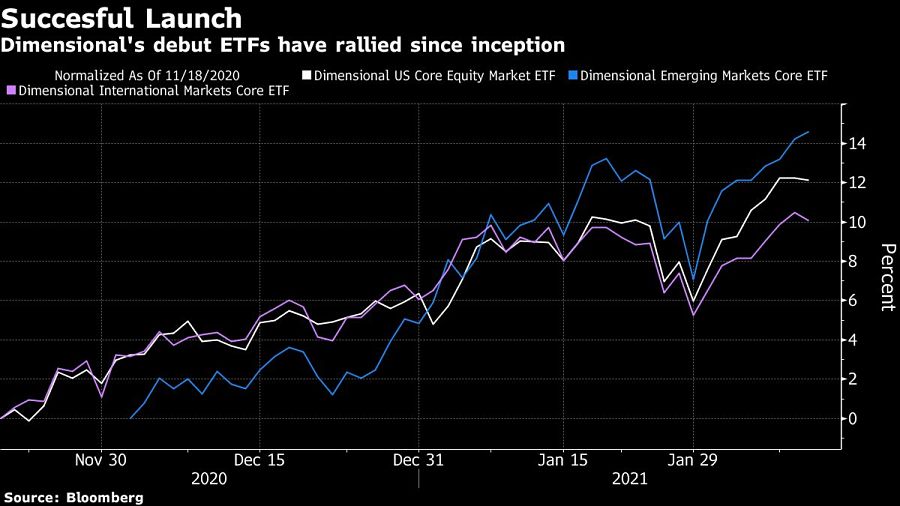

Dimensional Fund Advisors converted two more of its equity mutual funds into exchange-traded vehicles, further boosting the quant giant’s heft in the $6.8 trillion arena.
The Austin, Texas-based firm’s Tax Managed DFA International Value Portfolio and its T.A. World ex U.S. Core Equity Portfolio are now the Dimensional International Value ETF (DFIV) and Dimensional World ex U.S. Core Equity 2 ETF (DFAX), respectively, according to a press statement Monday.

The move adds two more funds and about $8.1 billion in assets to Dimensional’s ETF lineup. The firm founded by David Booth now boasts nine ETFs worth around $40 billion, according to data compiled by Bloomberg.
In June, Dimensional became only the second U.S. issuer to pull off a conversion, transforming $29 billion worth of mutual funds into ETFs in an industry record. The asset manager -- which controls $660 billion -- has aggressively targeted the ETF universe since launching its first products last November, touting the structure’s tax advantages and client demand.
Citigroup analysts said in a June forecast that Dimensional’s conversions would be one of several factors behind a $21 trillion shift from mutual funds to ETFs over the next decade. Bloomberg Intelligence expects $1 trillion worth of such switches to take place over the next 10 years.
JPMorgan Asset Management has announced plans to switch four funds with $10 billion in assets into ETFs next year.

Wealth managers highlight strategies for clients trying to retire before 65 without running out of money.

Shares of the online brokerage jumped as it reported a surge in trading, counting crypto transactions, though analysts remained largely unmoved.

President meets with ‘highly overrated globalist’ at the White House.

A new proposal could end the ban on promoting client reviews in states like California and Connecticut, giving state-registered advisors a level playing field with their SEC-registered peers.

Morningstar research data show improved retirement trajectories for self-directors and allocators placed in managed accounts.
Orion's Tom Wilson on delivering coordinated, high-touch service in a world where returns alone no longer set you apart.
Barely a decade old, registered index-linked annuities have quickly surged in popularity, thanks to their unique blend of protection and growth potential—an appealing option for investors looking to chart a steadier course through today's choppy market waters, says Myles Lambert, Brighthouse Financial.
